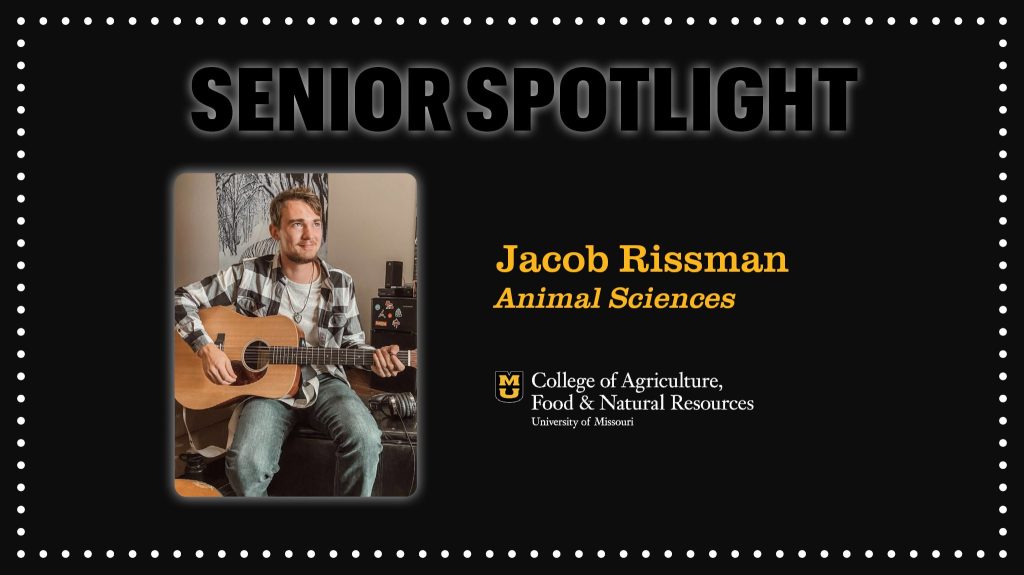
As a high school student, Jacob Rissman knew his passion for animals could lead to one of three vocations – farmer/producer, zookeeper or veterinarian. When Rissman started courses in the University of Missouri College of Agriculture, Food and Natural Resources (CAFNR) his eyes were opened to the numerous jobs an animal sciences degree could offer him.
Rissman, who will graduate in December with a degree in animal sciences, came to MU focused on becoming a veterinarian. After his first semester, he realized his future career was elsewhere.
“From a young age, I loved animals,” Rissman said. “When I was really young, my parents had these animal flashcards. I could barely talk, but I knew what every animal was.
“Coming here definitely opened my eyes to the possibilities of this degree. I remember going home after my first semester and telling my parents that I wasn’t going to be a veterinarian. I think they were a bit shocked and a little skeptical, honestly, but I knew there were going to be multiple options for me to pursue.”
After numerous hands-on learning opportunities, Rissman found a passion for research during his junior year. He began working for Robert Schnabel, an associate professor in the Division of Animal Sciences, doing genetics-related research.
“Doing undergraduate research has been an incredible experience,” Rissman said. “I get to take what I’ve learned in the classroom and apply it to real-world data. Plus, what we’re doing really matters. There is a huge translational component to this work, as what we do in animals can oftentimes translate to humans.”
Rissman said his goal after graduation is to continue conducting high-quality research – with Schnabel – through the animal sciences graduate degree program at MU. As far as potential career opportunities, Rissman said a job in population genetics is appealing.
“I really want to keep learning and growing as a person,” Rissman said. “My time here has gone by really fast and I’ve learned how to apply myself in my studies. In high school, I didn’t have a problem getting by. At MU, I’ve learned what it actually means to learn and retain information – and then applying that information in a real-world situation.
“I’ve been very fortunate to have the research opportunities that I’ve had, especially as an undergraduate student. It’s opened some really interesting doors. Working in population genetics, where I would have the opportunity to help animal populations grow and move forward, sounds really fascinating.”
Rissman will graduate with a minor in captive wild animal management as well. He said the two programs go together incredibly well.
“There was some really good overlap with the two degrees,” Rissman said. “I love that several of the courses in the captive wild animal management minor are very discussion heavy. Plus, there were numerous interesting guest speakers who really showcased various careers that handle animals.”
Rissman completed an internship last year at the Dickerson Park Zoo in Springfield, Mo., where he had the opportunity to do a variety of interesting tasks, including helping draw blood from a mountain lion. That experience, combined with his hands-on learning opportunities at MU, gave Rissman more hands-on work with animals than he’d ever had before.
“You can tell our faculty are really passionate about what they’re teaching, and I really appreciate that,” he said. “Not only are they here to help guide us, they help showcase how students can apply what they’re learning. Plus, the entire faculty is incredibly approachable. It’s really nice.”
Rissman said those hands-on opportunities were some of his favorite memories of his time in Columbia. Rissman, who grew up in the suburbs of Chicago, Ill., added that the time spent in his campus ministry, Alpha Omega, also left a lasting impact. He led Bible discussions and worship throughout his time in MU.
“Living in Illinois, I knew I could get in-state residency, so that played a big role in me coming here,” Rissman said. “I also knew I wanted to find a campus ministry, and when I toured MU I was able to hang out with several individuals in Alpha Omega. That really sold me. I grew a lot during my time here, and I hope to continue to grow after graduation. I would encourage all students to make the most out of their time here. There’s so much you can do – make sure you keep your eyes open. If I would have stayed focused on just becoming a veterinarian, I would have missed out on all of these great opportunities.”